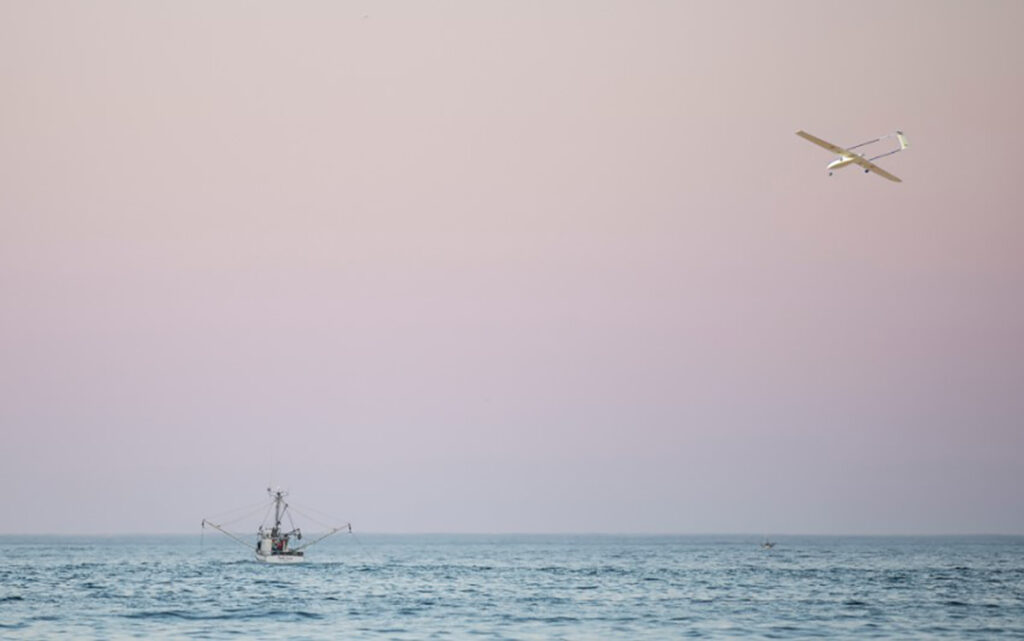ADF STAFF
As many African nations struggle to control illegal fishing, some are turning to drones as a relatively cheap way to conduct surveillance over vast expanses of ocean.
In March, the Seychelles Fisheries Authority announced that it had bought two long-range drones with artificial intelligence to perform fisheries surveillance in its huge exclusive economic zone (EEZ).
The technology was acquired through the FishGuard initiative, a cooperative venture involving Moroccan drone company ATLAN Space, fisheries intelligence analysis company Trygg Mat Tracking, and GRID-Arendal, a nonprofit environmental communications center.
Because the Seychelles’ EEZ is 1.3 million square kilometers, enforcing fishing laws is difficult, especially with limited resources. The Seychelles is an archipelago in the western Indian Ocean about 1,600 kilometers east of Kenya and about 1,100 kilometers northeast of Madagascar.
“What they currently have is patrol boats, which you can count on the fingers of one or two hands, and that’s it,” Valentin Emelin, who leads GRID-Arendal’s environmental crime program, told SeafoodSource. “And there may be aircraft, one or two planes, that can do reconnaissance flights or surveillance flights, and that’s it. Physical control is very difficult.”
The drones will include information about illegal fishing hot spots, Badr Idrissi, chief executive officer and co-founder of ATLAN Space, told CNN.
Artificial intelligence can verify the type of vessel a drone locks on, and the drone can determine whether the boat is operating in a protected area and whether it’s authorized to do so. Drones can relay the boat’s location, identification number and number of people on board to authorities by satellite.
Seychelles Air Force pilots were trained to operate the drones in cooperation with the Seychelles Coast Guard, according to a report by maritimescrimes.com.
Namibia also is studying the use of drones to fight illegal, unreported and unregulated (IUU) fishing, according to Farmers Review Africa magazine.
“With respect to IUU, the Ministry of Fisheries and Marine Resources is investigating the usefulness of drones in improving our operations,” the ministry said in a statement. “For instance, if a patrol craft (vehicle or patrol vessel) is in the vicinity of where a drone detects IUU fishing activity, the craft can be directed there to further investigate and take appropriate action.”
Before deciding whether to use drones, the ministry wants to study the usefulness of drone images and their ability to detect illicit fishing at night.
Challenges in Africa
The use of drones to combat IUU fishing is a growing trend, but African nations face challenges in using them, Ian Ralby, a maritime security expert who has written extensively on fishing issues, told ADF.
Drones are difficult to maintain in tropical weather conditions, smaller drones might not be able to be deployed long enough to provide adequate monitoring, and some drones can’t go beyond 12 nautical miles, making it difficult to cover a country’s EEZ, said Ralby, chief executive officer of I.R. Consilium.
“Even when you have everything working, the drone is maintained and covers the area that’s needed, you do run into the issue that not every state can admit evidence obtained through a drone,” Ralby said. “So, there’s an evidentiary issue for actually either prosecuting or proceeding on an administrative front the fisheries cases that would arise.”
Still, Ralby said he thinks drones can be useful in countering IUU fishing and other maritime crimes in Africa.
“We’ll likely see more of it in the years to come,” he said.


2 Comments
ADF should organise shortterm training for aafrican students those can join to work for africa
In my country sierra Leone drones are not regular in useage therefore we need some expertise to train people on how to use the drone.